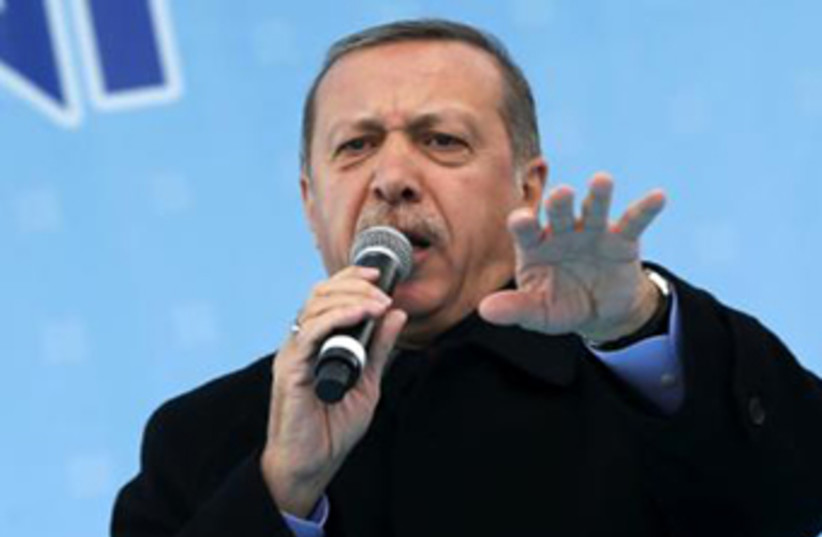This week's rapprochement between former foes Turkey and Egypt will lead to increased trade between them, analysts told The Media Line. They were speaking after Egyptian President Abdel Fattah al-Sisi announced on Monday that ambassadors would be posted by each country. Earlier, Sisi called Turkish President Recep Tayyip Erdoğan to congratulate him for winning the May 28 presidential election in Turkey.
For more stories from The Media Line go to themedialine.org
Sisi said that he and Erdoğan had agreed to "the immediate start of upgrading diplomatic relations, exchanging ambassadors,” the Reuters news agency reported.
The two leaders grabbed attention after they shook hands at the soccer World Cup last year in Qatar, one of Turkey’s closest allies.
Monday's announcement was seen as a major step in the rapprochement between the two countries, which have been in dispute for years over various issues, including their support for opposing sides in Libya, as well as Turkey’s support for the Muslim Brotherhood, an enemy of Sisi’s.
Özgür Ünlühisarcıklı, the German Marshall Fund’s Ankara office director, told The Media Line that Sisi’s announcement would be seen as a significant move.

“Sending ambassadors first upgrades the relationship and also is a symbol that the relationship is normalizing,” Ünlühisarcıklı said.
He said Saudi Arabia was using its financial assistance to both countries to push them to reconcile.
“Saudi Arabia is using its leverage over both countries to help them normalize their relationship,” Ünlühisarcıklı said.
He said Erdoğan’s top priority after the election is to improve the country’s economy, which is in dire straits, with inflation in April officially at 44 percent, and a rapprochement with Egypt would appease Saudi Arabia and increase trade.
One point of tension between the two countries was the East Mediterranean gas forum, a group of countries, including Egypt, that were cooperating to bring gas from the Middle East through the Mediterranean Sea to European markets.
Many of Turkey’s rivals are in the group, which analysts said made Turkey feel boxed in.
In response, Turkey made a deal with Libya, on the southern side of the Mediterranean, claiming that the two countries had territorial rights across the sea, which led to concerns that there could be a confrontation over accessing the waters.
Differing opinions on the rapproachment
Ünlühisarcıklı said that the Turkish-Egyptian rapprochement might be a disappointment to Greece, one of Turkey’s long-time foes because it would lose its competitive advantage as Turkey became less isolated in the region.
But the United States, one of Turkey’s key allies, would see the rapprochement as a good sign.
“It would decrease risks in the Eastern Mediterranean, which is good for the United States as well,” Ünlühisarcıklı said.
He added that there is now a better chance of Ankara being included in the East Mediterranean Gas Forum, and there had been positive messages from other leaders.
Following Erdoğan’s win, French President Emmanuel Macron tweeted that France and Turkey would face the challenges in the Mediterranean Sea together.
Amro Ali, a sociologist with a focus on Egypt and the Arab world at Free University Berlin, told The Media Line that one issue that will be on the table is Turkey's support for the Libyan government.
He said that while the outcome was still unclear, at least Turkey and Egypt would be cooperating more closely on the matter.
Another major source of tension has been Erdoğan’s support for the Muslim Brotherhood.
Ali said that while the group had limited its activities, such as with television channels it operated in Turkey, there would now be even greater pressure on it, and Egypt would likely ask for members living in Turkey to be returned to Egypt.
He agreed that trade would increase, and pointed out that trade still took place between the two countries even when relations were at their lowest point.
Ali said that while relations had been warming for the last couple of years, Sisi held off taking further steps until after the May 28 vote, and with Erdoğan's victory felt that rapprochement could occur.
“I think it was clear from before that he was taking a wait-and-see approach,” Ali said. “The [Turkish] election was really key for the Egyptian regime.”
